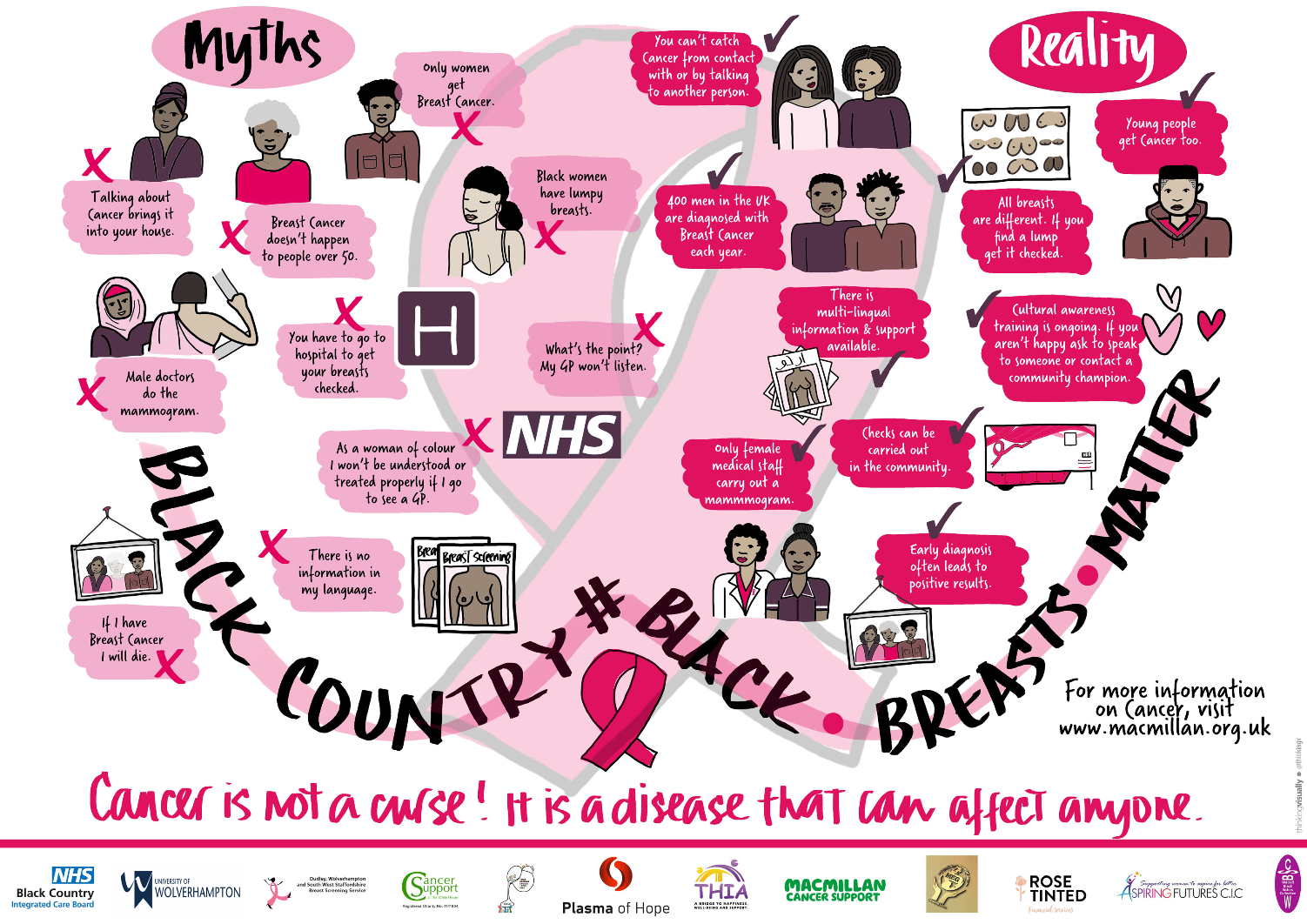A team has been leading on a unique project to help improve healthcare for Black African and Caribbean communities in the Black Country.
Using funding from the West Midlands Cancer Alliance, the Involvement Team from the NHS Black Country Integrated Care Board (ICB) has worked with partners from across the Black Country to understand the barriers Black African and Caribbean women face when attending breast screening appointments and raise awareness of the signs and symptoms of breast cancer.
As part of the Black Breasts Matter project, eight local voluntary and community sector organisations were commissioned to host conversations with local women in the community to help identify first-hand the barriers and stigmas in attending screening appointments or presenting at GPs with early symptoms. These included Walsall Black Sisters Collective.
The insight gathered from these groups was used to co-design solutions and interventions over a course of three workshops, led by Dr Martin Bollard, Head of Nursing in the Faculty of Health and Wellbeing at the University of Wolverhampton.
This includes an infographic which tells their stories, and a video of a local mother and daughter having a myth busting conversation and can be found on the ICB website here Black Breasts Matter :: Black Country ICB.
Marie-Claire Kofi is Chief Executive Officer of Plasma of Hope, a charity that provides supports for people living with sickle cell disease across the West Midlands and is one of the organisations that took part in the project.
She said: “When I heard about the project, I knew immediately that I wanted to be involved as it’s an important topic that has a huge impact on our community and we simply don’t talk about it enough. We hosted a number of sessions with the women and families that our organisation supports to discuss breast cancer, and we got a lot of different perspectives. Some assumed that only people over a certain age get breast cancer, and many didn’t know how to properly check their breasts.
“A key theme we spotted was that families didn’t want to talk about cancer, as they believed talking about it meant you were more likely to get it as you are welcoming it in. As a black woman, I can resonate with this, as I was also brought up not to talk about certain things. Because of the culture we come from, where topics like health issues aren’t discussed, there’s a real lack of awareness within the black community.
“Not talking about breast cancer doesn’t make the problem go away, so it was great to have these important conversations and help people understand and recognise the changes and what to look out for and dispel some of the myths around breast cancer.”
A number of the organisations who hosted the sessions have since taken part in Cancer Champion training. Hosted by the NHS Black Country ICB, the training program is designed in partnership with Cancer Research UK and gives participants the knowledge and confidence to have conversations in their community about cancer prevention, the importance of screening and early diagnosis.
Dr Martin Bollard, Head of Nursing in the Faculty of Health and Wellbeing at the University of Wolverhampton, has been leading the project and said: “I am delighted to have had the opportunity to work alongside the Black Country ICB and the wonderful, female, black African and Caribbean community leaders, representing hundreds of women across the Black Country. In a short space of time, we have captured the narrative on breast cancer screening from hundreds of women and shaped that ‘lived experience’ into products to share with others.
“This is helping to demystify some of the cultural taboos on breast cancer and raise awareness of the importance of early breast cancer diagnosis for this group of women. It’s been an absolute privilege being part of this project and I look forward to mobilising more knowledge on this important topic over the months ahead.”
Diane Wake, Cancer Lead for the Black Country Integrated Care System, said: “This is an important piece of work which has helped identify some of the barriers that Black African and Caribbean women face when attending breast screening and GP appointments in the Black Country.
“We know lives are saved when cancers are caught early, and I would urge anyone who has received a breast screening invitation – even if you received the invite weeks or months ago – to make an appointment – it could save your life.
“This month is also Breast Cancer Awareness Month, so I’d like to take this opportunity to remind women of all ages of the importance of being breast aware. This means getting to know how your breasts look and feel at different times, so you know what’s normal for you and telling your doctor straight away if you notice any unusual changes.”
Under the NHS Breast Screening Programme eligible women will receive their invite for breast cancer screening every three years between the ages of 50 and 71. Women should look out for their invite letter and follow the instructions to book an appointment.
If you think you’ve missed your breast screening appointment, or you have not been invited by the time you are 53, you should contact your local breast screening service here Find breast screening services – NHS (www.nhs.uk)

